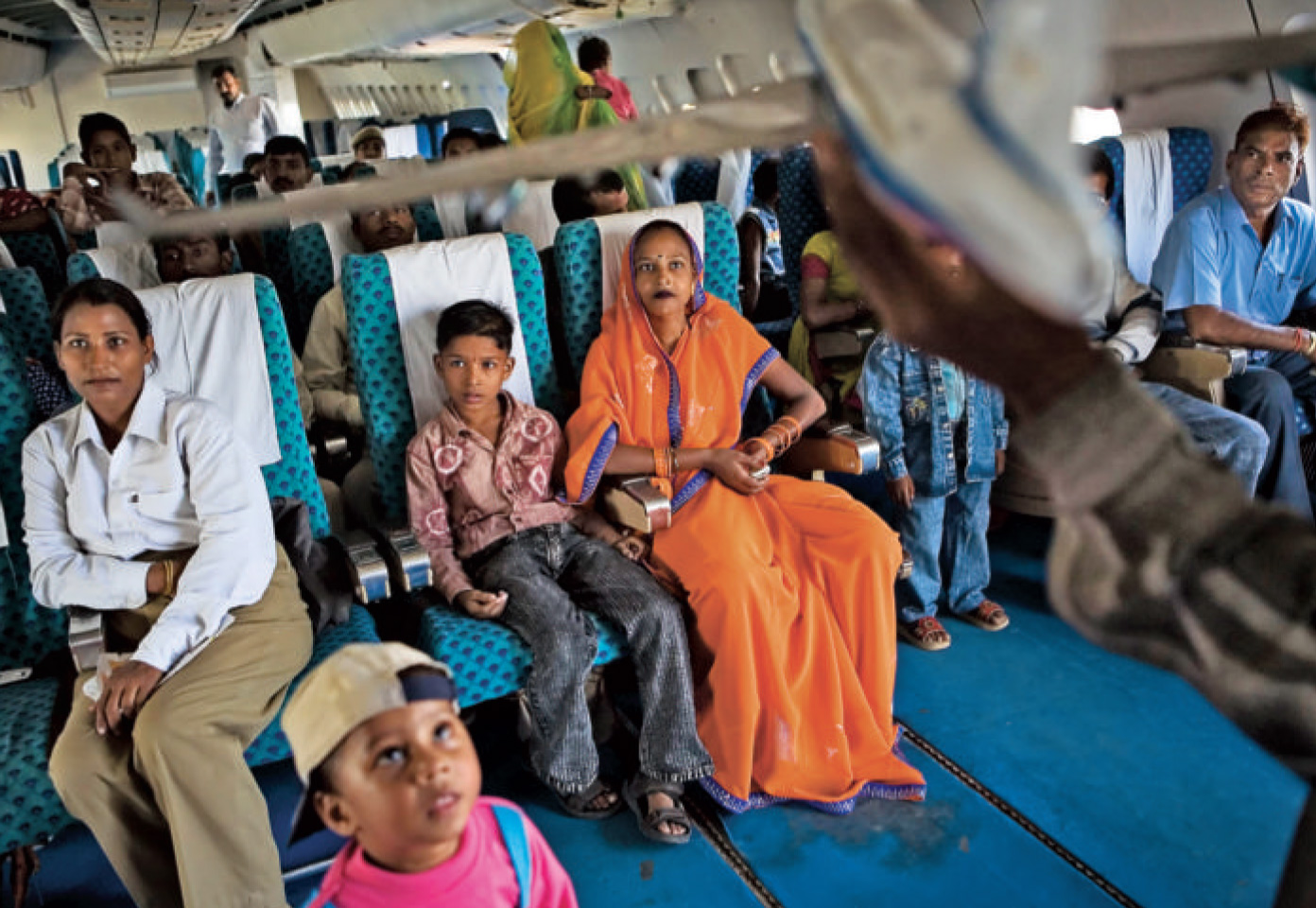
Lost luggage. Frustrating delays. Bad food. It’s hard to get excited about flying these days. Hard, that is, unless you’ve just boarded the Airbus A300 owned by former Indian Airlines engineer B.C. Gupta. Take, for example, the safety demonstration. After asking for a volunteer from the 120 or so kids crammed, some two to a seat, in the plane’s economy-class cabin, flight attendant Ridhi Sehgal explains how the oxygen masks work. A plastic deck chair appears, and Sehgal helps the volunteer, a worried-looking boy of 7, up onto it so that the other passengers can see him. “This is just for show,” Sehgal explains. “You don’t have to stand on your chair. The oxygen will drop down to you.” The perky attendant runs through various drills, ending with life-vest use. “Do you know swimming?” she asks the boy. He looks around nervously before giving a small shake of his head.
He needn’t worry. The Airbus isn’t flying over water today. It isn’t flying anywhere. Jammed into a suburban backyard near Indira Gandhi International Airport, its nose and tail jutting over the property’s walls, the plane offers the adventure of air travel without the cost–or even the travel. Its passengers, most of whom have never been on a plane before, pay up to $4 each to join the jet set for a few hours. India’s skies may be busier than ever these days, as a raft of budget carriers have made flying in India more affordable, but even a $20 ticket is too expensive for most Indians. “Flying,” says Gupta, “is still beyond the reach of the common man.”
Which, as he knows, doesn’t mean people can’t dream. Born in a small village–“We were not even having a bus”–Gupta got the idea for his enterprise more than 20 years ago when neighbors begged him for tours after he landed his job at Indian Airlines. “The people from my village thought I was a very big man and could show them the aircraft,” he says. “But due to security I could not.” In 2003 he bought a 20-year-old Indian Airlines plane “that had met with a small ground incident,” cut it up and reassembled it in Dwarka, a fast-growing neighborhood of weed-infested sidewalks and burgeoning middle-class aspirations. Because space is limited, the plane has been cut down to about two-thirds its normal length and is held in place by thick concrete pillars. Inside, Gupta replaced the bulkhead between the coach and business cabins with a wooden wall so he could mount an air conditioner to cool the cabin in New Delhi’s oppressive summer heat.
During the week, Gupta uses the plane to train engineering students and flight attendants. On weekends, under the billing Aeroplanet, it is open to the public and school groups. Poor villagers and students can visit free. “Passengers” check in, receive boarding passes and climb a steep metal staircase to enter the plane. Flight attendants then run them through the safety procedures, serve them snacks and cold drinks and answer questions about how an aircraft works. In a nod to a more innocent time, passengers are free to visit the pilots in the cockpit. “We are fulfilling life wishes,” says Gupta. “We want people to have a good time, to inspire them, so that kids see that if they study hard they might become a pilot.”
Gupta’s wife Nirmal Jindal, who teaches political science at the University of Delhi, says they also hope to show people who might fly in the future how it’s done. “We want to orient them about aviation manners,” she says. “People have money, but they do not know how to behave. We want to acquaint them with the cost of a plane, the safety aspects, how to treat the hostesses.” Still, for many passengers, the experience is mainly about letting dreams take wing. The weathered Airbus is “beautiful to sit in,” says local resident Anisha Khan, who recently took a few hours out from caring for her three children to take a ride. “When we have more money, then we’ll go on a real plane.”
More Must-Reads from TIME
- Cybersecurity Experts Are Sounding the Alarm on DOGE
- Meet the 2025 Women of the Year
- The Harsh Truth About Disability Inclusion
- Why Do More Young Adults Have Cancer?
- Colman Domingo Leads With Radical Love
- How to Get Better at Doing Things Alone
- Michelle Zauner Stares Down the Darkness
Contact us at letters@time.com